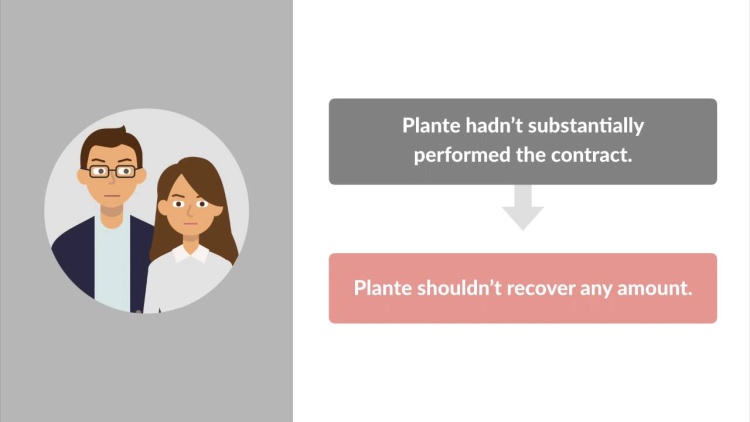Plante v. Jacobs
Wisconsin Supreme Court
10 Wis. 2d 567, 103 N.W.2d 296 (1960)

- Written by Christine Hilgeman, JD
Facts
Frank and Carol Jacobs (defendants) contracted with Eugene Plante (plaintiff) to construct a house for them according to specifications set out in their written agreement. The total price for building the house was $26,765, and the Jacobses paid $20,000 during the construction. The Jacobses, who had concerns about the quality of the construction and perceived flaws in the work completed thus far, refused to continue paying Plante. Plante ceased building the house and sought to place a lien on the property to collect the remaining balance of the contract price. The Jacobses argued in defense that Plante failed to substantially perform because various aspects of the construction either remained incomplete or were poorly constructed and in need of repair or replacement. They claimed that the cost of repairing the defects and completing the work would be 25 to 30 percent of the contract price. Among the repairs to be made were cracks in the plaster, the patio floor, and a nonstructural patio wall. The Jacobses also asserted that the living room was constructed one foot from where it was supposed to be built according to the contract specifications. The trial court found that the contract was substantially performed by Plante and applied the cost-of-repair rule in determining damages. The Jacobses appealed to the Wisconsin Supreme Court.
Rule of Law
Issue
Holding and Reasoning (Hallows, J.)
What to do next…
Here's why 910,000 law students have relied on our case briefs:
- Written by law professors and practitioners, not other law students. 47,100 briefs, keyed to 997 casebooks. Top-notch customer support.
- The right amount of information, includes the facts, issues, rule of law, holding and reasoning, and any concurrences and dissents.
- Access in your classes, works on your mobile and tablet. Massive library of related video lessons and high quality multiple-choice questions.
- Easy to use, uniform format for every case brief. Written in plain English, not in legalese. Our briefs summarize and simplify; they don’t just repeat the court’s language.





